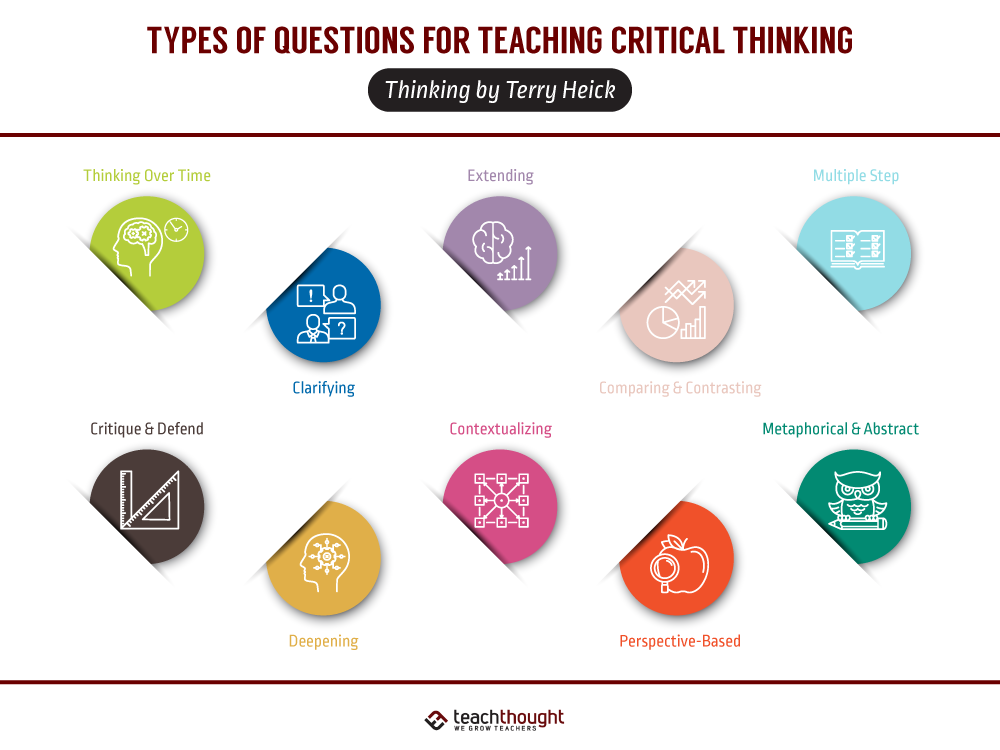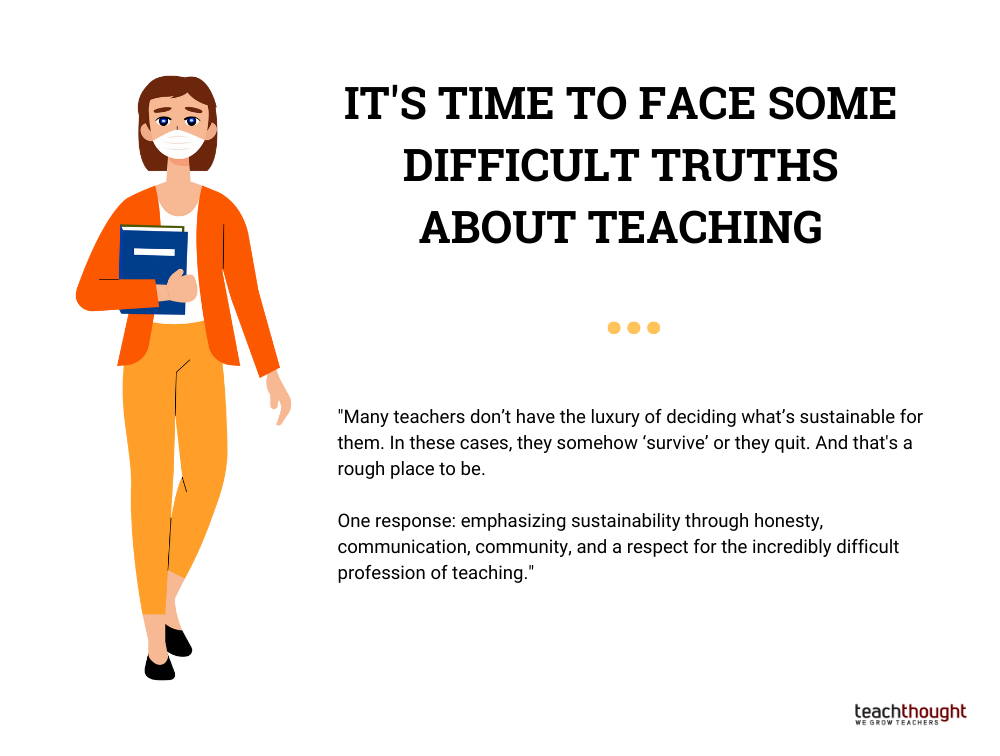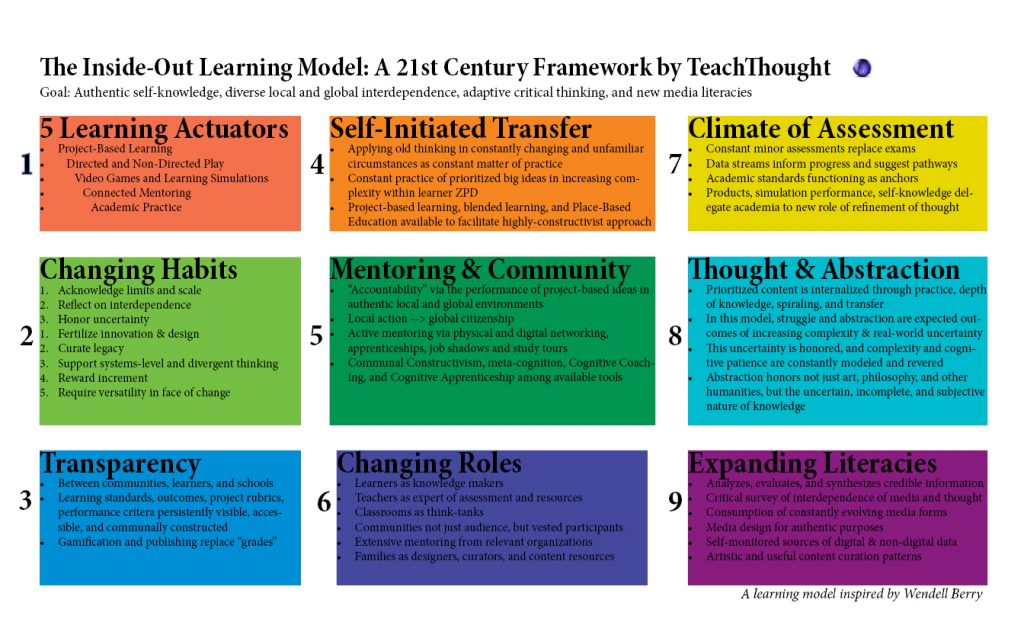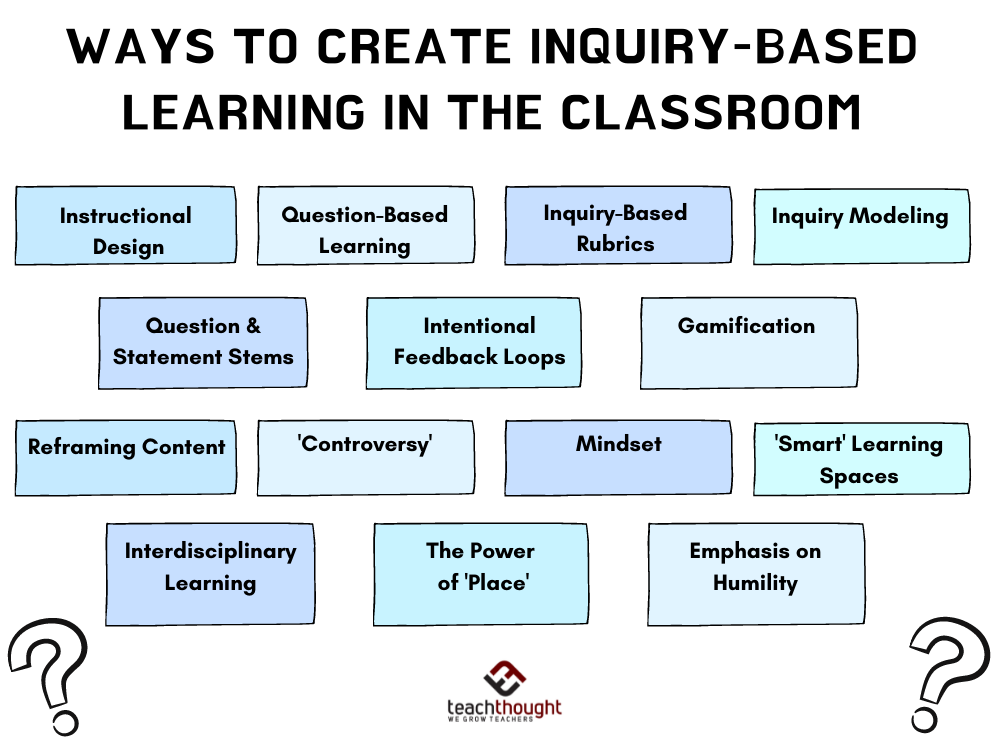
by Terry Heick
What are the different types of inquiries? Turns out, it’s quite limitless.
I have actually always wanted them– the means they can cause (or quit) reasoning; the nature of query and reason; the means they can facilitate and grow a conversation; the way they can disclose understanding (or do not have thereof); the spectacular power of the best inquiry at the correct time.
There’s a type of humbleness to inquiries. Someone who doesn’t know asks somebody who might. Or perhaps somebody that does recognize (rhetorically) asks somebody that does not to generate a result (rhetorically). There’s a loved one intimacy between a person asking and answering inquiries, one that claims, ‘We need one another.’
It’s from that type of perspective that TeachThought was established, so it was unusual to me when I understood recently that, after years of discussing inquiries and concerns stems and the power of questions and more, I hadn’t ever blogged about the kinds of concerns.
After doing some study, I realized that identifying plainly what the ‘kinds of concerns’ are isn’t very easy due to the fact that there isn’t a set number. Similar to when I blogged about kinds of transfer of learning or sorts of mixed understanding , it was clear that although I maintained seeing the exact same classifications and concern types, there really had not been a limit. When I asked myself, ‘What are the various sort of concerns?’ I was asking the wrong concern.
A minor modification: What are several of one of the most usual kinds of questions? What are the categories of questions? What are the most usual types of questions? This brought about several lots of responses. There are lots of sorts of inquiries and groups of questions and kinds of questions et cetera and on. A whole book can be covered the subject (if not a collection of books).
Yet we need to start someplace, so listed below I have actually started that kind of process with a collection of kinds of inquiries for training critical assuming — a collection that truly needs far better organizing and clearer formatting. Ideally I can reach that quickly.
Let’s begin with some basic ones.
Common Types Of Evaluation Questions
Multiple-choice/Single : A concern with multiple offered answers for the -responder to pick from however just one right remedy
Multiple-Choice/Multiple : An inquiry with numerous available answers for the -responder to choose from and more than one appropriate service
See The Issue With Multiple-Choice Questions
True-or-false : A declaration that the responder must make a decision is ‘true’ or ‘false’
Fill in the empty : A statement with a key item of details missing that the responder should include in make the statement total and true
Matching : The majority of commonly, Matching Inquiries have two columns and each column has actually products categorized by a clear policy that has to be matched to things on the opposing column. For instance, the column on the left can have words and the column on the right can have definitions. Other opportunities:
Left Column/Right Column: Inventors/Inventions; Types of Government/Strengths and Weaknesses, Geometric Shape/Formula to compute location; and so on.
A variant of the Matching Concern has one column holding extra things than the other. This usually makes the question more intricate– or at the very least more difficult– as the -responder can not be sure all things are utilized and have to be a lot more selective. Deductive reasoning (process of removal, as an example) is much less available to the responder.
Short-Answer : This is much less close-ended than the above common evaluation questions kinds. In a brief solution, the responder needs to address the timely without the advantage of any type of extra info or possible responses.
Analogies : These aren’t precisely a type of ‘inquiry’ but analogies superb analysis devices and can be utilized in a number of the various other kinds of questions– multiple-choice as an example.
Pig: Mud:: Bird: _____ (simple)
Pig: Mud:: Mitochondria: ___ (much less easy)
What Are The Different Groups Of Concerns?
This set isn’t easy or standard either. There are just a lot of various methods to consider query.
You could, for example, make use of every level of Flower’s Taxonomy and say that there are ‘Evaluation-level concerns’ and ‘Analyze-level’ inquiries and ‘Keep in mind’ and more. A great deal of this boils down to function: as an instructor, what are you wanting the inquiry to ‘do’? With that in mind, let’s look at simply a couple of instances (this is by no suggests an exhaustive listing).
The Meaning of Valid Inquiries: Concerns with unambiguous, more or less generally accepted objective answers based on expertise.
The Meaning of Interpretive Concerns : Questions meant to interpret something else — a comment, masterpiece, speech, poem, etc. The emphasis here is on the assuming procedure and will usually cause an enhanced understanding of that ‘other’ (rather than showing knowledge as is the case in a Factual Concern. Reactions to Interpretive Questions should be evidence-based yet are inherently subjective, open-ended, and ongoing.
The Interpretation of Evaluative Inquiries : Inquiries that stress one’s personal opinion– of the worth of a law or the stamina of a writer’s thematic growth, as an example.
Analytical Questioning and Academic Examining are common forms of examining and inquiry whose duty is basic and whose patterns are clear and simple sufficient to see and adhere to.
The Definition Of Analytical Questions: Inquiries indicated to understand– to determine the ‘components’ and recognize just how those components work together and depend upon and impact each other. Analytical Questions depend on other higher-level reasoning skills like identifying, associating, and arranging by guidelines or other phenomena.
An example of an Analytical Question could be to ask a pupil about personality motivation in a novel or how scientific research drives technology–“What is the lead character’s motivation in the story and exactly how do we know?” or ‘Why was this occasion crucial?’.
The Interpretation Of Didactic Questions: Structured, official concerns frequently regarding truths and knowledge at the recall and comprehension degree, including bearing in mind, defining, explaining, calling, identifying, etc.
Instances Of Didactic Concerns: ‘Who, what, where and when’ can be examples of Didactic Questions while ‘Why’ has a tendency even more towards an Analytic Concerns (see below).
Sidenote: Questioning And The Socrative Approach
The Socrative Technique is amongst one of the most popular variation of the Didactic technique, where trainees are (or can be, depending upon how the workshop is structured) assisted by ‘a lot more knowledge others’ (MKO) individualized and expanded reflection via inquiry. This, naturally, can result in the thinker dropping their own dogma and reaching enlightenment.
It’s not extremely scalable in a class with one educator and 34 students, which is where the Socrative Seminar is available in– a ‘built-for-the-classroom structure to bring learning-through-questioning’ right into conventional instructional areas. This Socrative Workshop (or ‘Technique’) is a formal technique to inquiry-based discussion where open-ended concerns are made use of to facilitate discussion by pupils that reply to motivating from the educator or remarks and inquiries from other students. It’s not specifically a ‘kind of question’ however is a style to make use of concerns to advertise understanding in a class.
This approach is dialectical and dialogic, relying on the capability of students and educators to be able to explain in words usually intricate and abstract thinking. A ‘excellent’ concern in a Socrative Workshop would be a lot different than a ‘excellent’ question on a criterion-referenced assessment. What is a ‘excellent question’?
The quality of a question, then, is extremely contextual– and to answer it with any kind of clarity, you have to be able to respond to: For that student because scenario back then, what did that question do What was the result of that inquiry?
See also’ The Connection Between Top Quality And Impact ‘
Kinds of Concerns For Teaching
Clearing up Question : An inquiry suggested to make clear something– either a question asked by the educator to clarify the response a student offers or what the trainee thinks or an inquiry asked by the pupil to the teacher to clear up something (a declaration, a task, an inquiry, etc)
Penetrating Inquiries : A penetrating question does what it sounds like it could: Functions as a query tool to discover a topic or a student’s reasoning and existing understanding of a topic. Probing inquiries also have different kinds, including Emphasizing, Clarifying, Redirecting, Evaluative, Prompting, and Essential Evaluation.
Reviewing Time Questions : Concerns that review a concept, subject, or perhaps concern in time. This can highlight modification with time and lead to cause/effect conversations concerning the adjustments. This can also concentrate on metacognition– one’s reviewing time and how it has changed, etc.
Prolonging Inquiries : Inquiries indicated to remain to lead a discussion, analysis, or ‘discovering occasion,’ often after a ‘effective’ event promptly prior. For instance, if a pupil is asked a concern concerning adding fractions and they answer efficiently, the teacher can ask an ‘Extending Inquiry’ about including combined numbers or decimals.
Deepening Questions : Similar to Extending Questions, a Deepening Question increases in intricacy instead merely expanding what’s been learned. In the circumstance over, after addressing the concern about including portions, an instructor could ask just how backers or the order of procedures may affect adding fractions.
Transfer Questions : Concerns implied to ‘laterally’ prolong a concept without necessarily becoming much more complicated. If talking about the orbit of Saturn, you could ask an ‘Extending Question’ suggested to take expertise gleaned from that discussion and use it
Contextualizing Inquiries : Questions implied to make clear the context of a topic/question/answer rather than to generate an ‘response.’
Perspective-Based Concerns : Concerns concentrated on the result viewpoints carry responses and/or ‘truth.’ Point of view Questions can additionally be asked from specific points-of-view– a trainee might answer an inquiry about government from the viewpoint of a modern person, resident of an ancient society, famous historical number, particular political celebration, etc.
Concrete Inquiries : Generally a ‘close-ended’ inquiry, Concrete Questions ask students to provide ‘concrete’ solutions– names, quantities, formulas, facts, qualities, etc. See the following product for an instance.
Metaphorical & & Abstract Questions : The reverse of Concrete Questions, Abstract Questions meant to draw attention to or extra closely understand abstract concepts or the abstraction in non-abstract ideas.
These can also be taken Thematic or Theoretical Concerns. For instance, asking a trainee to determine the 3 branches of the United States federal government would be a ‘Concrete Inquiry’ while asking to define, from their viewpoint, the merits of democracy or exactly how ‘liberty’ impacts citizenship are instances of Perspective-Based Abstract Questions.
Compare & & Contrast Questions : Inquiries that– you thought it– ask trainees to determine the means 2 or more ‘things’ (concrete or abstract, as an example) coincide and various.
Claim/Critique & & Defend Questions : Questions (or triggers) that ask students to make an insurance claim or provide a ‘objection’ (e.g., of a disagreement), then protect that case or criticism with concrete evidence.
Cause & & Effect Concerns : An additional basically self-explanatory category, Cause & & Result Concerns need pupils to different cause from result or focus on mostly causes or mostly impacts. These can be Concrete or Abstract, or Perspective-Based too.
Open-Ended Questions : Frequently subjective concerns suggested to advertise discussion, query, and so on. Open/Open-ended questions are main to Socrative Discussion (though closed/yes or no questions can be equally as reliable sometimes because examining is an art).
Closed Questions : Concerns with yes or no answers usually used to check for understanding, stress an idea, or reveal info
Leading Concerns : Inquiries suggested to ‘lead’ the thinking of the -responder in a certain direction for an intellectual or psychological impact
Packed Questions : Questions installed with an underlying assumption– one that could contain defective thinking, bias, etc. This concern is identified by those damaged or otherwise distracting assumptions as opposed to the analysis or answer.
Dichotomous Question : A kind of Closed Concern with just 2 answers (generally Yes/No)
Show Questions (Known Info Concern): A means to check for understanding; a sort of question that needs the answerer to ‘execute’ or show their understanding by responding to a concern the questioner currently understands the solution to.
After that there are Referential Concerns : A naturally subjective question, Referential Questions create brand-new details and can be either open or closed-ended inquiries.
An Example of a Referential Concern: Which character in Macbeth would be probably to be an effective YouTuber (or ‘streamer’) today?
Rhetorical Concerns : A concern asked to develop some form of effect rather than generate a solution. These serve in conversations yet can additionally be utilized in writing as well. Besides, who is going to address an inquiry presented by an author in an essay?
Epistemic Concerns : Concerns concerning the nature of expertise and understanding. This is even more of a content-based category rather than an universal ‘kind of question,’ though asking trainees concerning the nature of expertise in math or scientific research– just how we create it, just how we understand if it’s precise, the worth of that understanding, and so on– can be made use of in the majority of content locations.
Divergent Concerns : According to Wikipedia, a different inquiry is a “question with no certain answer, but rather works out one’s capability to assume generally about a particular topic.”
Inductive Concerns : Concerns indicated to trigger or generate the -responder to form basic concepts theories based on observation, proof, or information. In inductive thinking, the final thought or debate ends up being extra general than the facilities that motivated it.
Deductive Inquiries : Inquiries indicated to support the responder in forming a the offered concept based on continued testing. In deductive thinking, the conclusions attracted are much less basic (i.e., extra details) than the facilities provided and in a legitimate deductive logic, the final thought has to hold true if the premises are true.
5 Ws Questions : Wonderfully straightforward and devastatingly effective inquiries: That, What, Where, Why, and When? And you can include ‘Exactly how’ to the listing, as well. These include Who, What, and Where questions? These can be useful in led discussion, representation motivates, the formation of necessary concerns , and extra.
Examples Of Making use of’ 5 Ws Concerns’ For Important Thinking
What’s the factor?
What’s the big concept?
What’s the objective?
What is the procedure?
What’s more crucial here? Less important?
What vital details are we missing?
What did they believe or believe and how did that idea change in time? What added to that modification?
Why should I discover this?
What should I perform with what I’ve discovered?
What is the author, speaker, create, or artist ‘saying’ here? What are they underlying presumptions of that message?
What is the author’s viewpoint? What do I believe and how does that affect what I think others believe– or exactly how does it impact what I think about what they do think?
What should I inquire about this?
How can I improve the questions I or others have currently asked?
Is the answer wrong or is the concern ‘wrong’?
Education Expert
Founder & & Director of TeachThought



